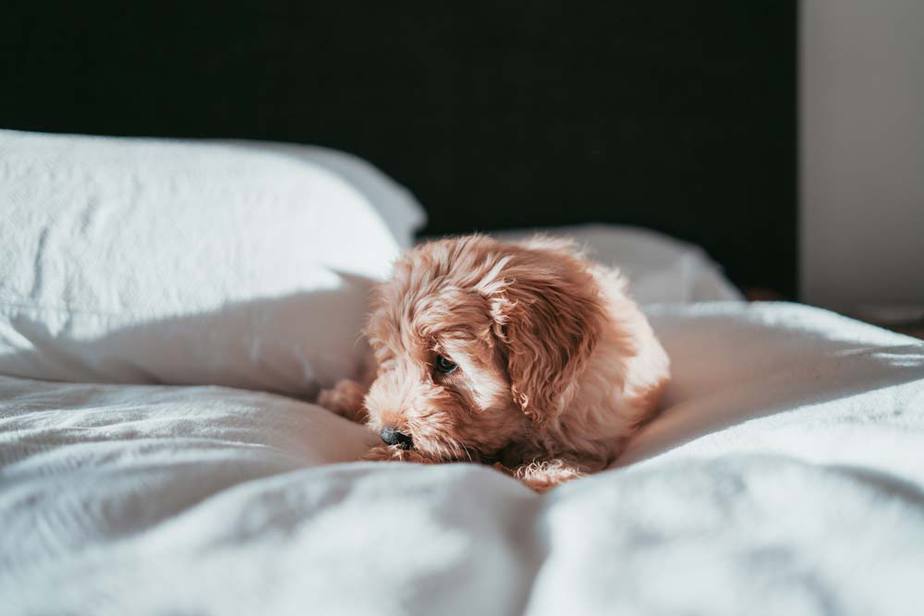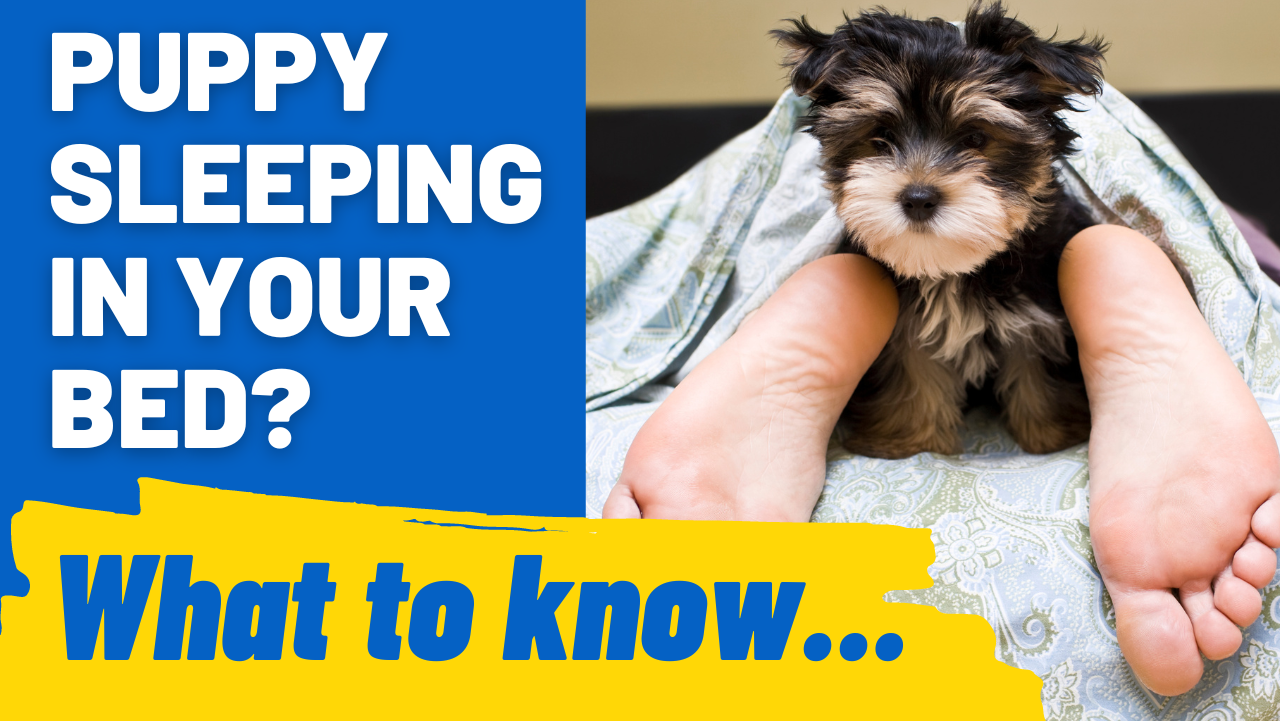Getting a new puppy is such an exciting time. It can be tempting to want to let your puppy sleep in bed with you, especially when they’re so soft and snugly! However, letting your puppy sleep with you, especially at first, can lead to some problems down the road. In this post, we’ll be exploring problems that can occur when you let your puppy sleep in your bed at night, and what you should do instead.
Why Your Puppy Shouldn’t Sleep in Bed with You at Night
It is not recommended to let your puppy sleep with you at night. It’s important to teach your puppy independence so they don’t become reliant on your company. Not learning this valuable skill can lead to separation anxiety in the future, and we have an in-depth post on this here.
Trainers recommend that your puppy learns to sleep on their own so as not to become too dependent on their owners. At night when puppies are naturally tired, it’s a perfect time for them to learn that it’s OK to be alone sometimes.
When puppies don’t have breaks from their owners, they will often get anxious and destructive when they find themselves without them. Even if you normally work from home, or are around almost all the time, you should strongly consider giving your puppy breaks during the day to practice being alone as well.
One way to ease the transition away from a litter and into your home is to purchase and use a stuffed dog that mimics the heartbeat and warmth of a real dog. These toys are specifically designed to help puppies become comfortable without the presence of a person or another dog.

Allergies
Another reason to avoid letting your puppy sleep in your bed at night is allergies. Not only can the fur and dander of your pet cause you to develop allergy symptoms, especially when sleeping with your face in the middle of it all, but pets can bring other allergens into the home, too.
Our dogs don’t wear shoes outside and don’t take showers nearly as frequently as we do! This makes it really easy for our dogs to track pollen, dust, and other potential allergens into our homes, and into our bedrooms.
If you struggle with allergies, keeping your puppy off your bed in general is a good idea. This way, you’ll prevent allergens from ending up stuck to your pillowcase.
Aggression
Letting your puppy sleep in your bed sets up a potential situation for aggression in the future. While not all puppies will display aggressive behavior at a young age, this characteristic can develop later in life due simply to maturity, or even to arthritis and pain in older dogs.
For dogs that resource guard or show aggressive behavior to protect and keep what they want, the bed can be a prime resource. After all, it’s the comfortable place where they are used to sleeping. This can set up a potentially dangerous situation if your dog decides to start guarding your bed from you or from your spouse.
In addition, you can think back to the saying, “Let sleeping dogs lie.” When startled awake, some dogs are prone to snapping until they are fully aware of the situation. If you move in your sleep at all, you can accidentally startle your dog and put yourself at risk.
Where Should My Puppy Sleep at Night?
Instead of letting your puppy sleep in your bed at night, you can consider putting them in a crate, tethering them, or keeping them in a designated room. All three of these options will prevent your puppy from sleeping in your bed, while allowing enough variation that you can find the choice best for your puppy.
Crate or Kennel
One of the most common places for new puppies to sleep at night is in a crate or kennel. Not only is this option ideal for house training (puppies don’t usually like to pee in the same place they sleep, especially when it’s not excessively large), but it sets your dog up for a lifetime of success.
Puppies that have been trained to be comfortable in a crate or kennel are often able to participate in a lot more activities than dogs who aren’t. Dog daycares often use crates or kennels for nap-time and is the perfect way to contain your puppy while visiting a new place. A stay at the vet clinic in the kennel will be much less scary, too!
The best way to get your puppy used to the crate is to put them in when they’re already tired (such as naps during the day, or overnight) and leave them with something to safely chew on to keep them from being bored.
Tethering
Besides crating, tethering at night can be a great way to limit your puppy’s ability to roam without confining them. This option is usually the best choice for puppies that are working through a fear of a crate. This occurs when crate training hasn’t been properly introduced to them.
Tethering involves putting your puppy on a leash or other form of tether and attaching them to something, usually a piece of furniture, to limit their range. The best tethers are ones that won’t easily be chewed.
The best place to tether your puppy depends on the set up of your room and your puppy’s size. If your puppy is too short to jump into your bed, tethering them to the bed itself can be a great option. The biggest concern when tethering is making sure that you are near your puppy in case of emergency (or in case they need to go outside for a bathroom break).
Their Own Room
Another common option is to give your puppy their own room. If you have the space, your puppy can spend time playing in their room that has been extra puppy-proofed and which can also act as their bedroom for sleeping.
However, not all houses allow for a designated dog room and it isn’t the best option for potty training puppies either. Too much space allows the puppy to potty in one corner and sleep in another, and can put a damper on your potty training.
It’s also important to choose the right bed for your puppy and we cover that in this post here.

Will My Puppy Pee in My Bed?
Yes, puppies will wee in your bed. Puppies do not have full control over their bladder muscles until they are 4-6 months old. Even when following a training plan for potty training, your puppy will not have the physical ability to have full control until close to 6-months old.
In all likelihood, if you let your young puppy sleep in your bed, you will end up with a few accidents.
Most of us will bring our puppies home around 8-10 weeks old. While potty training can (and should) be started as soon as possible, it’s unrealistic to assume that even the best trainer can prevent ALL accidents.
In addition, if your puppy does have an accident on your bed, your mattress will be much harder to clean than your floor. If any scent is leftover after cleaning, your puppy will be even more likely to use the bathroom on your bed again, too.
While you can use an enzymatic cleaner designed to break down the components of urine, it’s safest to avoid trying to clean the mattress in the first place.
In order to prevent your puppy from learning a bad habit, it’s best to avoid letting your puppy sleep in your bed for long periods of time. Instead, let your puppy up on your bed when you are awake and can monitor them closely and also have a good understanding of how often your pup needs to go potty.
You should also make sure that your puppy has recently been outside, to limit the chance of your puppy peeing in your bed.

Should I Let My Puppy Sleep on my Lap?
While we’ve discussed how sleeping in your bed isn’t the best option for new puppies, you might be wondering if your puppy can spend any time sleeping with you at all. The answer is absolutely yes!
Just because the bed isn’t ideal for sleeping overnight, your puppy can (and should) absolutely spend some time snuggling with you and forming a bond.
If allergens aren’t a concern, short periods of snuggling in bed is OK. However, couches and chairs (or even the floor) make great options too, especially if you’d like your puppy to sleep in your lap.
One consideration is how big your dog will be as an adult. If you don’t want an 80-pound lap dog in the future, then you should make sure to have rules and boundaries with your dog as a puppy.
Invite your puppy up on a cue, and make sure they are able to jump off if you ask them to do so. That will help make sure that your dog is able to snuggle and sleep with you only when you want them to, instead of having a large and pushy dog in the future.
Just because there are a lot of reasons to not let your puppy sleep in your bed, doesn’t mean you can’t spend time snuggling and loving your puppy! As your puppy becomes house-trained and develops manners that you’d like to see in them as an adult, you can consider letting them spend the occasional night in bed, too.
However, when you first get your puppy, you will want to consider other options to set your puppy up for success in the future!
Final Word
Your puppy is a lifetime commitment. While they might be small and love to snuggle right now, they won’t stay small forever! Rather than starting a habit of sleeping in bed with you at night when your medium to large-sized dog is a puppy, it’s easier to get them used to a habit that will exist for most of their life.
Also, just because you should teach your puppy to spend time alone and avoid having them in your bed at night, doesn’t mean that they have to be completely alone. Putting your puppy in a crate or tethering them in the room are two easy ways you can confine your dog to their own space, but also be present.




